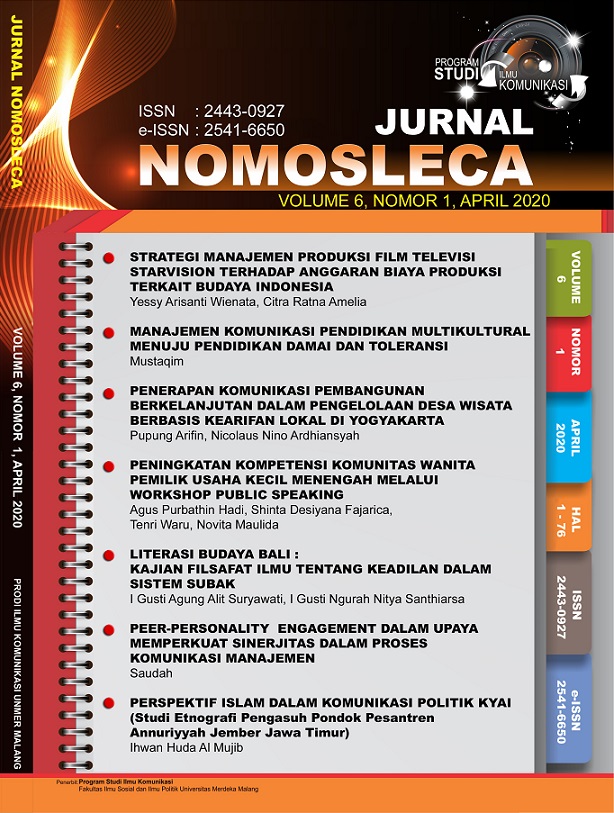Peer-Personality Engagement dalam Upaya Memperkuat Sinerjitas dalam Proses Komunikasi Manajemen
DOI:
https://doi.org/10.26905/nomosleca.v6i1.4038Abstract
Effective management communication is an important key for the implementation of a work environment that uses telematics equipment. This illustrates the dual conditions that reflect the use of technological devices, as well as contributions made by creative thinkers, thus emphasizing the quality and quantity of dynamizing personal interests into the organization. In conditions carried by routine, there are still many work organizations experiencing a decrease in productivity which is inversely proportional to the strengthening of the family atmosphere among individuals. Conflicts that often arise in the work environment are understood as conditions that are not conducive, but unwittingly becomes one of the steps to return the individual to a proportional position, and this is where it actually is without realizing the importance of peer-personality engagement to overcome organizational problems that are always developing. By using a literacy approach to several research and literature publications, supported by empirical experience in work organizations that use telematics bases, and then verify some information that has been obtained to formulate the results of the study. The results of the study put management communication under very strong pressure to harmonize relationships, and as quickly as possible balance the various interests of the urgent work organization. Strengthening synergy through the management communication process, has put peer-personality engagement as a quality standard to solve organizational problems with the following this statement: (1) agreed as a guideline and habit in every action that leads to improving the quality of work organization; (2) making it a measure of determining the level of risk to be received by comparing costs and rewards; and (3) determine and socialize these two things as rules or values that are always negotiated so that they can be improved according to circumstances.
Â
Keywords: Peer-Personality Engagement, Work Environment, Management Communication
Downloads
References
Abidin, Y. Z. (2015). Manajemen Komunikasi. Filosofi, Konsep dan Aplikasi. Jakarta: Pustaka Setia.
Adi, D. S., & Saudah. (2018). Keseimbangan Komunikasi Dalam Penguatan Identitas Komunitas Kreatif Telematika Kota Malang. Mediakom, 1(2). https://doi.org/10.32528/mdk.v1i2.1574
Daryanto, & Raharjo, M. (2016). Teori Komunikasi. Jakarta: Gava Media.
Devito, J. A. (1997). Komunikasi Antarmanusia (5th ed.). Jakarta: Professional Books.
Golsteyn, B. H. H., Non, A., & Zölitz, U. (2017). The Impact of Peer Personality on Academic Achievement The Impact of Peer Personality on Academic Achievement*. Diakses di http://www.econ.uzh.ch/static/wp/econwp269.pdf
Hanurawan, F. (2010). Psikologi Sosial. Bandung: Rosdakarya.
Hasrullah. (2013). Beragam Perspektif Ilmu Komunikasi. Jakarta: Kencana Prenada Media.
Katuuk, O. M., Mewengkang, N., & Kalesaran, E. R. (2016). No TitlePeran Komunikasi Organisasi Dalam Meningkatkan Eksistensi Sanggar Seni VOX Angelica. Acta Diurna, V(5). Diakses di https://media.neliti.com/media/publications/91632-ID-peran-komunikasi-organisasi-dalam-mening.pdf.
Morissan. (2013). Teori Komunikasi Individu Hingga Massa. Jakarta: Kencana Prenada.
Moss, S., & Tubbs, S. L. (2001). Human Communication, Prinsip-Prinsip Dasar. Bandung: Remaja Rosdakarya.
Muhammad, A. (2005). Komunikasi Organisasi. Jakarta: Bumi Aksara.
Nasution, Z. (1989). Teknologi Komunikasi Dalam Perspektif Latar Belakang dan Perkembangannya. Jakarta: FE Universitas Indonesia.
Panuju, R. (2001). Komunikasi Organisasi dari Konseptual-Teoritis Ke Empirik. Yogyakarta: Pustaka Pelajar.
Rosilawati, Y., & Mulawarman, K. (2014). Komunikasi Organisasi pada Dinas Perijinan Kota Yogyakarta. Makna, 5(1), 31–41. jurnal.unnisula.ac.id
Saudah. (2015). Dampak Perkembangan Teknologi Komunikasi Seluler Terhadap Perilaku Adaptif Pedagang Pasar Tradisional. Diakses di SNIRA. https://www.researchgate.net/publication/326930081_DAMPAK_PERKEMBANGAN_TEKNOLOGI_KOMUNIKASI_SELULER_TERHADAP_PERILAKU_ADAPTIF_PEDAGANG_PASAR_TRADISIONAL
Saudah. (2018). Pendekatan helping relationship pada management komunikasi.
Siregar, N. S. S. (2012). Interaksi Komunikasi Organisasi. Perspektf, 5(1), 27–40. ojs.uma.ac.id
Suranto, A. (2011). Komunikasi Interpersonal. Jakarta: Graha Ilmu.
WA, G. (2004). Psikologi Sosial. Bandung: Refika Aditama.
Zahara, E. (2018). Peranan Komunikasi Organisasi Bagi Pimpinan Organisasi. Warta, 56. Diakses di jurnal.dharmawangsa.ac.id.
Zamralita. (2013). Pengaruh Kepribadian Terhadap Work Engagement. IJAS, 3(3), 88–93.
Downloads
Published
Issue
Section
License

This work is licensed under a Creative Commons Attribution-ShareAlike 4.0 International License.





